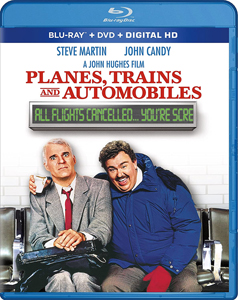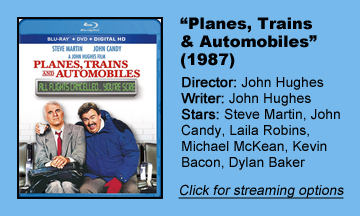If we started a debate over the greatest Christmas movie, it could go on until New Year’s, but “greatest Thanksgiving movie” is easier: It’s “Plains, Trains and Automobiles” (1987), an all-timer not only among Turkey Day films but also among the catalogs of John Hughes, John Candy and Steve Martin.
Cleverly, it’s not about the family gathering itself, but rather about getting home to family – and it ultimately has a heartfelt message about the holiday’s original meaning.
The long (funny) way home
“PT&A” – Hughes’ fifth entry as both writer and director – has almost as much absurd humor as the “Vacation” films, as he’s no doubt drawing upon personal experience with all the things that can go wrong on a simple journey from New York City to Chicago.
Our point-of-view character, perhaps surprisingly, is Martin’s Neal Page, who is in marketing. He’s the de facto villain among the duo, especially if we focus on the scene when he rips into Candy’s traveling shower-curtain-ring salesman Del Griffith.
It’s the last straw when Del clears his sinuses before bedtime in their shared, cramped motel room.
Yet Martin keeps this comedy grounded, and we never lose sympathy for Neal. The things he deals with – like being dropped off at a rental-car space only to find the car isn’t there – are legitimately annoying.
It’s totally human to go off on an F-bomb-laden rant when one considers everything he’s been through to that point. In fact, I’d argue that Neal maintains and impressive air of patience overall.
Del goes with the flow
Del, meanwhile, goes with the flow – if he has a breaking point, he doesn’t reach it as quickly as the average person. His connections are the reason they get back to Chicago at all – after stops in Wichita and St. Louis and a bevy of truck, train, bus and car rides.
I’m impressed by how much my all-time No. 1 comedy, 1994’s “Dumb and Dumber,” owes to “PT&A.” The obvious specific example is when the duo is traveling in the back of a pickup in 1-degree weather; we pan from Del’s iced-over face to Neal’s to that of a dog whose growl is frozen in place. But the premise that more unexpected things will happen the longer a trip goes is central to both films.
Hughes balances the mildly begrudging (from Neal’s POV) friendship with absurd comedy premises such as the car that catches on fire. He invites us into his game, often teasing us with the next problem before getting to it – Del’s cigarette is smoldering in the backseat long before we get to the payoff.
Still, “PT&A” isn’t as uproarious as “D&D.” It’s a satirical version of how traveling in the USA can be a low-grade nightmare, but – like the Ben Stein classroom scenes in “Ferris Bueller” – Hughes doesn’t exaggerate all that much.
Relatable travel woes
If your flight is canceled due to weather during the travel season, you’re likely to not find a hotel room. Trains and buses will be “booked tighter than Tom Thumb’s ass,” as Del puts it in one of those great lines that’s illogical yet makes perfect sense.

While travel woes remain relatable, “PT&A” has gained additional charm through the years because of the trust between these two strangers. It was pragmatic in 1987, but suspicion is pragmatic today.
That said, Neal is initially wary, with Del’s offers of help always being the lesser evil in his predicament. Hughes nicely plays on gay panic in a couple motel room scenes, including the classic moment where Del thinks his hand is between two pillows.
Thanksgiving usually plays better in a TV episode, because we know the characters and feel the weight of the dinner-table arguments and reconciliations. But “Plains, Trains & Automobiles” figures out how to do the holiday in film form.
Neal is focused on getting home to that TV episode, but he accidentally finds a friend along the way, and Hughes crafts the definitive “bromance” long before the term was coined.


